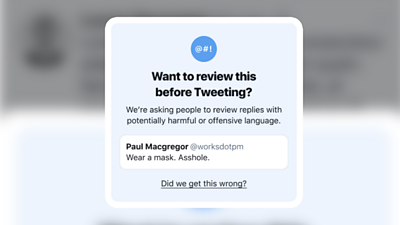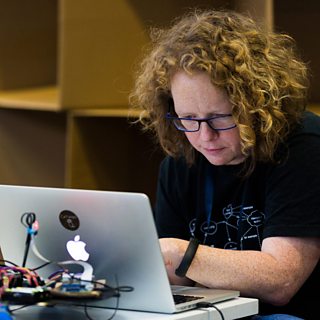The R&D Futures project develops our ability to pick up on trends in audience habits and their media and technology landscapes. We try to extrapolate how these trends might play out over the next few years and how R&D and the �鶹Լ�� might respond.
One of the ways we do this is by gathering links to things that we think look like signals of changes in the world and periodically bundling them together for analysis. This is our bundle for June 2022!
The project is run by Libby and Henry and a rotating crew of colleagues from across R&D and the wider �鶹Լ��. If you're interested in collaborating with us, get in touch!

We are in an era of increasing protests |
Crypto crash fallout
In May, Bitcoin fell heavily, halving in value since its recent peak a couple of months ago. Etherium has recently dropped by two thirds. At the riskier end of crypto, because of the failures, and various investors including , are suffering heavy losses. it that the trouble seems not to be spreading to the rest of the economy, but that crypto is big enough to to be having its own banking crisis. .
There are likely to be a lot of losers, some of them . We discussed worries about where the sadness and rage of some investors might go, and who might be most heavily affected; in the US, , while in parts of South America it may .
- (New York Times)
- (Business Insider India)
- (The Sun)
- (Economist) - (The Guardian)
- (Rest of World)
— Libby
Spotify acquire Sonantic
Sonantic is a startup that has created a speech synthesis system that focusses on expresivity. It achieves this by creating voice models of actors in different styles (e.g. excited, angry, sad). The system was used in the latest Top Gun movie to voice Val Kilmer, who has lost his voice. Last week, Spotify announced they will acquire Sonantic to “enable us to engage users in a new and even more personalized way”. Meanwhile, in New Zealand, Spotify is doing a public test of recording podcasts in the Spotify app itself.
These signals point to Spotify shifting towards democratisation of content creation, possibly similar to YouTube. They are talking about personalisation, and this acquisition suggests that would include personalisation of the content itself (rather than just recommendation).
— Chris Baume
Twitter show that ‘niceness’ prompts do alter user behaviour

A recent study by Twitter researchers and Yale Law School has shown that prompting users to reconsider potentially aggressive or mean posts is effective at reducing the number of offensive tweets sent.
An algorithm was used to check whether posts seemed aggressive or offensive, and if so a prompt was sent to the user asking them if they wish to review it. Of the 100,000 users exposed to revision prompts during the study, 9% cancelled their tweet and 8% revised it to be less offensive.
In addition, receiving a prompt was shown to encourage users to continue to avoid offensive and aggressive language, sending fewer offensive tweets in future. Comparisons were made to the , which advised children as they typed in online chats.
If this intervention-based model worked in the long term, we could see a nicer Twitter, and eventually a nicer internet. Optimistically, we can hope that social media users benefit from a less hateful atmosphere! On the other hand, perhaps that could mean platforms such as Twitter lose users in the long term, if hate is part of their value proposition. And potentially users will change their language to avoid being flagged by the algorithm, creating new offensive slang or terms - linking to a previous signal about how .
- Study:
— Sonal Tandon
We are in an era of increasing protests
A number of recent studies tracking and understanding protests and demonstrations around the world are seeing a rise in events. looking at demonstrations between 2006 and 2020 found that “the number of protest movements around the world had more than tripled in less than 15 years. Every region saw an increase, the study found, with some of the largest protest movements ever recorded.”
Common reasons given for protesting were ‘perceived failure of political systems or representation’, inequality, corruption, lack of action over climate change, and the sense that people’s concerns are not being addressed.
See also:
— Nick Ritchie
TikTok as the default search engine
TikTok is becoming a place that people use to search as you would usually do on a search engine such as Google. The benefits are seen as getting a short, 15 second, information dense video showing you exactly how to do something, make something, cook something, and if something is good or not. A similar pattern happens with Reddit where people will append search queries with ‘reddit’ in order to see what Reddit has to say on a subject as they find this provides better results.
This potentially has implications for organisations such as the �鶹Լ�� who would likely rank highly on search engines such as Google but may lack the same reach on platforms such as TikTok. This could be seen as a broader issue of SEO (search engine optimisation) becoming less important and even worse as the results contain more adverts and spam than useful information.
— Todd Burlington
‘GPU Flood is Here’
News broke this month that crypto miners in China and South Asia are shutting down operations and auctioning off graphics cards for cheap, in huge numbers.
While this is an interesting signal in itself of the ongoing crypto crash, I think it’s also interesting to think about what happens next as a result of all these cards suddenly becoming avaialable. We’ve previously covered microprocessor shortages in general and GPU shortages in particular, and the throttling effect that this may be having on e.g graphics development or AI research. What happens when those bottlenecks are removed, or at least the computational power needed to explore and experiment in these areas becomes more evenly distributed?
Take, for example, the current noise around powerful AI models like GPT-3 and DALL·E 2. These large models take a lot of training time to create, and thus experimentation and ownership is limited to the large companies that can afford to create and run them. Could a glut of GPUs on the open market give rise to community efforts to build large AI models? This is already happening in some areas of AI - there are already many community built models around which replicate some of the results and techniques of the larger models, so it’s not a stretch to imagine larger community efforts using more graphics cards.
This kind of democratisation is not always a good thing - OpenAI, for instance, frequently publish about their guidelines and ethical stance on AI issues - what happens when models of a high level of sophistication become usable by people without ethics panels? I semi-jokingly tweeted this about the news:
me a few years ago: yeah, I don’t think we really need to worry about deepfakes. there’s easier, more effective attacks and the amount of compute you’d need is a huge barrier me now: ah
— Henry Cooke (@prehensile)
I still think that there are more effective ‘fake news’ attacks than deepfakes, but I do also think that there could well be some pretty nonlinear effects from a bunch of GPU power being out in the wild.
Of course, in reality those cards will probably fall into the hands of the next generation of crypto miners and gamers looking for a cheap upgrade. And there’s that the cards are probably not in the best condition, and might only have a few months use left in them.
— Henry Cooke

